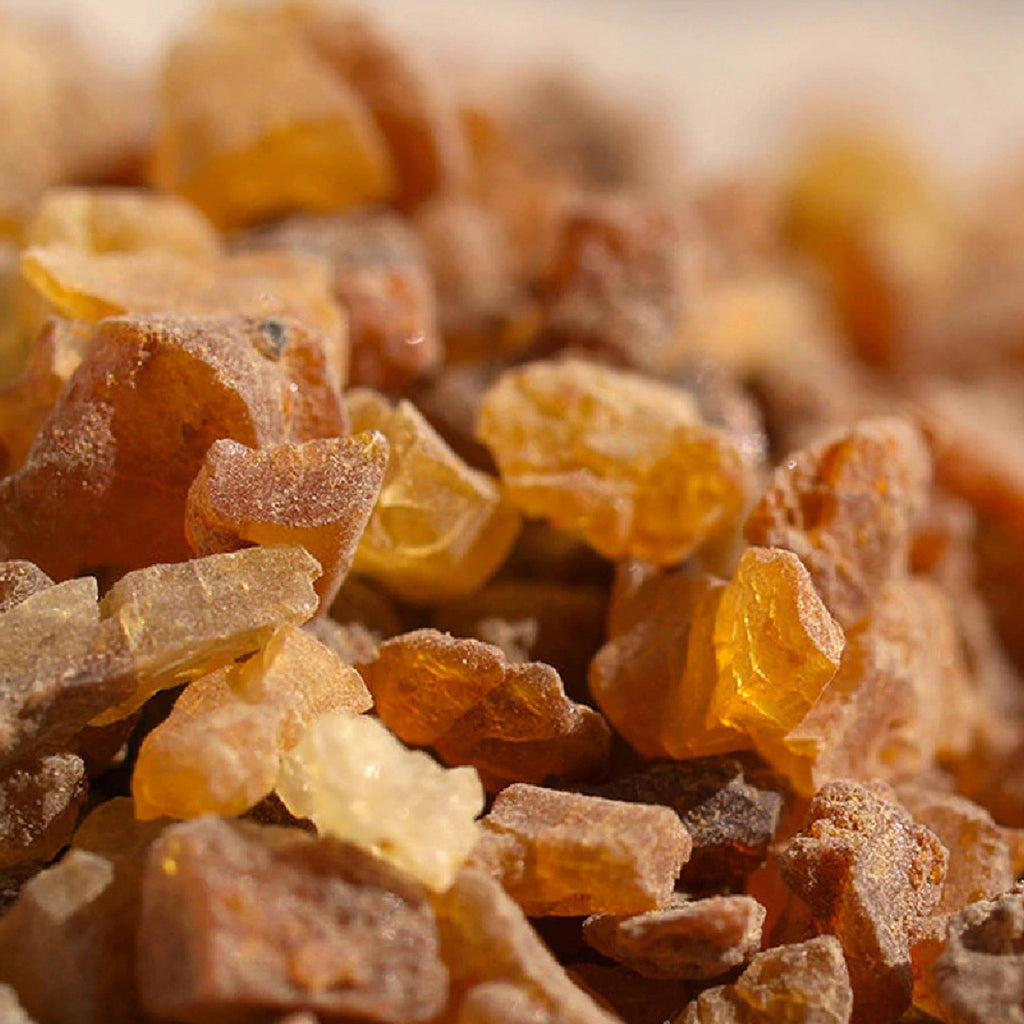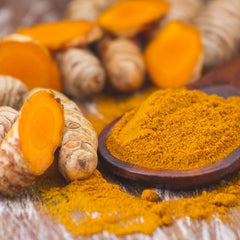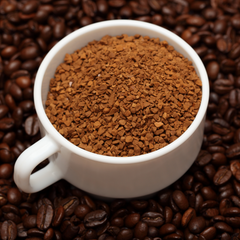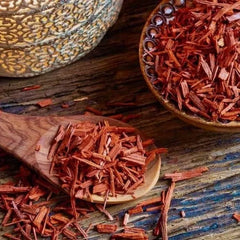What Does Myrrh Smell Like?
As An Amazon Associate We Earn From Qualifying Purchases At No Extra Cost To You
Embark on a mystical journey to ancient lands and explore the captivating aroma of myrrh. Originating from the resin of Commiphora trees, myrrh has a rich history and a scent that evokes the sacred and the exotic. Join us as we delve into the question: What does myrrh smell like?
What Does Myrrh Smell Like?
The fragrance of myrrh is a captivating blend of resinous warmth, earthy undertones, and a hint of balsamic sweetness. Imagine the ancient aroma of sacred rituals and spiritual ceremonies. Myrrh's scent is a timeless journey, offering a sense of grounding and mystery that has intrigued perfumers and seekers alike for centuries.
Myrrh's Resinous Warmth
Step into the realm of myrrh, where the first olfactory impression is a resinous warmth that envelopes the senses. The scent is reminiscent of a sacred balm, a resin slowly released by the trees in response to the elements. Myrrh's fragrance exudes a comforting and grounding warmth, like the embrace of ancient rituals and time-honored traditions.
Earthy Undertones: An Olfactory Voyage
As you explore myrrh's scent, you'll encounter earthy undertones that transport you to the heart of mystical landscapes. Picture the damp soil beneath ancient trees, the scent of the forest floor after a gentle rain. Myrrh's earthy notes add depth to its fragrance, creating a connection to nature's secrets and the wisdom embedded in the soil.
Balsamic Sweetness: Nectar of the Gods
Amidst the resinous warmth and earthy richness, myrrh unveils a subtle balsamic sweetness. This touch of sweetness is like the nectar of the gods, a delicate and enchanting facet that balances the overall composition. Myrrh's balsamic sweetness adds a touch of divine allure, elevating its scent to a realm of spiritual and sensory sophistication.
Mystical Aura: Essence of Sacred Ceremonies
Delve deeper into the scent of myrrh, and you'll discover a mystical aura that embodies the essence of sacred ceremonies. Whether used in ancient rituals, perfumery, or modern spiritual practices, myrrh's fragrance carries a timeless mystique that transcends cultures and traditions.
Myrrh's Spiritual Symphony
In conclusion, myrrh's fragrance is a spiritual symphony of resinous warmth, earthy undertones, balsamic sweetness, and a mystical aura. It stands as a testament to the sacred and timeless qualities of this ancient resin, inviting us to immerse ourselves in its captivating scent. Myrrh, with its complex and evocative aroma, beckons us to embark on a fragrant journey through the ages, where the whispers of history linger in each aromatic note.
Factors Influencing the Scent of Myrrh Fragrance Oil
Myrrh fragrance oil is a carefully crafted composition designed to capture the unique and captivating scent of myrrh resin. The formulation of this fragrance involves a thoughtful combination of aromatic compounds. Here are several factors that contribute to the rich and complex scent of Myrrh fragrance oil:
-
Fragrance Composition: Myrrh fragrance oil is a meticulously blended mixture of various aromatic compounds, chosen to replicate the characteristic scent of myrrh. This composition may include both synthetic and natural ingredients to achieve the desired olfactory profile.
-
Resin Essence: At the heart of the fragrance lies the essence of myrrh resin. Notes of resinous warmth, earthiness, and balsamic sweetness are intricately blended to mirror the captivating and sacred aroma of myrrh.
-
Synthetic vs. Natural Components: Myrrh fragrance oil often combines both synthetic and natural ingredients. Perfumers make choices to strike a balance between authenticity, cost considerations, and sustainability in the selection of these components.
-
Extraction Method: The method used to create Myrrh fragrance oil, whether through distillation or extraction, plays a crucial role in defining the aromatic profile. Specific extraction methods contribute to the faithful recreation of the resinous and earthy scent of myrrh.
-
Additional Resinous and Woody Notes in the Blend: The fragrance may incorporate additional resinous elements or subtle woody notes to enhance complexity. These complementary notes contribute to the overall richness of the scent, capturing the essence of myrrh.
-
Quality of Ingredients: The quality of raw materials, including the source of essential components, directly influences the authenticity and depth of the myrrh scent in the fragrance oil.
-
Perfumer's Artistry: The expertise and creativity of the perfumer or fragrance creator are crucial. Perfumers leverage their skills to balance different components, creating a distinctive and captivating myrrh fragrance.
-
Regulatory Compliance: Adherence to regulatory standards and restrictions on certain fragrance ingredients is crucial. Compliance with safety guidelines requires careful consideration of ingredient choices to ensure the fragrance is safe for use.
-
Usage in Products: Myrrh fragrance oil can be incorporated into various products, including perfumes, candles, room sprays, and bath products. The interaction with other ingredients in specific product formulations can influence how the myrrh scent is perceived.
-
Product Type and Concentration: The concentration of Myrrh fragrance oil in a product affects the strength and longevity of the scent. Higher concentrations may be suitable for perfumes, while lower concentrations work well for candles, soaps, or room sprays.
-
Storage Conditions: Proper storage conditions for Myrrh fragrance oil, both before and after formulation, are essential to maintain its stability and scent. Storing it in a cool, dark environment helps preserve the freshness of the fragrance.
-
Consumer Preferences and Trends: Formulations of Myrrh fragrance may adapt to changing consumer preferences and market trends. The timeless and spiritual nature of myrrh makes it a classic choice that transcends fleeting trends.
-
Artisanal vs. Commercial Production: Differences between artisanal and commercial production of Myrrh fragrance oil may impact ingredient sourcing, formulation, and overall quality. Artisanal methods may emphasize craftsmanship and unique blends.
-
Post-Formulation Processing: Additional processes, such as aging or filtering after the formulation of the fragrance oil, may influence the final scent and contribute to the desired characteristics.
Exploring different formulations of Myrrh fragrance oil allows consumers to experience a range of resinous, earthy, and mystical scents reminiscent of the ancient and sacred resin. Individual preferences play a significant role in selecting the perfect Myrrh fragrance for various applications.
What to Look for When Choosing Myrrh Fragrance Oil
Selecting a myrrh fragrance oil allows you to immerse yourself in the ancient and mystical scent of myrrh resin. Whether used in perfumes, candles, or spiritual practices, consider these factors to ensure you choose a high-quality and authentic myrrh fragrance oil:
-
Resinous Authenticity: Seek a myrrh fragrance oil that authentically captures the resinous warmth, earthiness, and balsamic sweetness of real myrrh. Look for a fragrance that embodies the unique notes characteristic of quality myrrh resin.
-
Natural vs. Synthetic: Determine whether the fragrance oil is derived from natural sources or is synthetically produced. Natural myrrh oils can provide a more nuanced and realistic scent, closely resembling the aroma of actual myrrh resin.
-
Blend Ingredients: Check the blend of ingredients in the fragrance oil. A well-crafted combination of natural and synthetic components can contribute to a balanced and long-lasting myrrh fragrance.
-
Intensity Level: Consider the intensity level of the myrrh fragrance. Some may prefer a subtle and grounding scent, while others may desire a more pronounced and mystical aroma. Look for a fragrance that aligns with your desired level of intensity.
-
Versatility: Choose a fragrance oil that is versatile and suitable for various applications. Whether used in perfumes, candles, or spiritual rituals, versatility allows you to experience the ancient scent of myrrh in different settings.
-
Packaging: Assess the packaging of the fragrance oil. Opt for a bottle that is dark or opaque to protect the oil from light exposure, preserving its freshness and preventing deterioration over time.
-
No Residue or Discoloration: Ensure that the myrrh fragrance oil leaves no residue or discoloration when incorporated into different products. A high-quality oil should seamlessly integrate into various mediums without causing unwanted effects.
-
Manufacturer Reputation: Research the reputation of the manufacturer or brand. Choose well-established brands with positive reviews, as they are more likely to produce reliable and high-quality fragrance oils.
-
Testing Options: Look for fragrance oils that offer testing options or sample sizes. This allows you to experience the scent firsthand before committing to a larger quantity, ensuring it aligns with your preferences.
-
Ethical and Sustainable Practices: Consider the manufacturer's commitment to ethical and sustainable practices. Brands that prioritize responsible sourcing and environmentally friendly production contribute to a more conscientious choice.
By considering these factors, you'll be better equipped to choose a myrrh fragrance oil that not only aligns with your preferences but also ensures a high-quality and spiritually enriching olfactory experience in your chosen applications.
Where to Find Reputable Myrrh Fragrance Oils
Discovering high-quality myrrh fragrance oils can add a touch of ancient mystique to your perfumes, candles, and spiritual practices. Here are some places to find reputable myrrh fragrance oils:
-
Specialty Perfume Suppliers: Explore specialty stores or online suppliers that focus on perfume-making supplies. These suppliers may offer a selection of myrrh fragrance oils suitable for creating unique and exotic perfumes.
-
Aromatherapy Shops: Aromatherapy stores often carry a variety of fragrance oils, including those with spiritual and grounding scents. Inquire about the availability of myrrh fragrance oils for use in diffusers and rituals.
-
Online Fragrance Oil Retailers: Browse reputable online platforms specializing in fragrance oils. Websites dedicated to aromatherapy, candle making, or DIY crafting may have an extensive selection of myrrh fragrance oils. Check product descriptions and customer reviews for authenticity and quality.
-
Artisanal or Handmade Markets: Attend artisanal markets or craft fairs where independent sellers showcase handmade products. Artisan vendors may create unique and carefully crafted myrrh fragrance oils, providing an opportunity to explore distinct options.
-
Local Essential Oil or Perfume Shops: Specialty shops focusing on essential oils or perfumes may carry myrrh fragrance oils. These stores often prioritize high-quality scents and may offer a range of exotic aromas.
-
Online Marketplaces: Platforms like Etsy or other online marketplaces featuring handmade or artisanal products can be sources for myrrh fragrance oils. Look for sellers with positive reviews and detailed information about their products.
-
Herbal and Spiritual Supply Stores: Check with stores that specialize in herbal and spiritual supplies. These establishments may carry myrrh fragrance oils that align with the sacred and mystical nature of the resin.
-
Candle and Soap Supply Shops: Explore stores dedicated to candle and soap supplies, as they often carry a variety of fragrance oils suitable for crafting scented candles. Myrrh fragrance can add a unique dimension to candle-making projects.
-
Local Apothecaries: Visit local apothecaries or holistic health shops that focus on natural remedies. These establishments may carry myrrh fragrance oils for aromatherapy and spiritual practices.
-
Word of Mouth: Seek recommendations from friends, family, or members of fragrance communities for trusted sources of myrrh fragrance oils. Personal experiences and suggestions can guide you to reputable suppliers known for quality and authenticity.
-
Check Ingredients and Descriptions: Before making a purchase, carefully read product descriptions and check ingredient lists for myrrh fragrance oils. Authentic and reputable sellers provide clear information about the composition and intended use of their products.
Note: Myrrh fragrance oils can bring a sense of ancient mystique to your creative projects. Ensure that the fragrance oil you choose aligns with your intended use, whether it's for perfumes, candles, diffusers, or other spiritual practices. Follow safety guidelines provided by the manufacturer for proper usage.
20 Questions and Answers about Myrrh:
-
What is myrrh? Myrrh is a resin obtained from the Commiphora tree, particularly Commiphora myrrha. It has been used for centuries in perfumery, medicine, and religious rituals.
-
How is myrrh harvested? Myrrh is harvested by making incisions in the bark of the Commiphora tree. The resin oozes out and hardens into tear-shaped droplets, which are then collected.
-
What does myrrh smell like? Myrrh has a rich, warm, and balsamic fragrance. It is often described as sweet, resinous, and slightly spicy, with earthy and woody undertones.
-
What are the main components of myrrh essential oil? Myrrh essential oil contains compounds such as terpenoids, sesquiterpenes, and other aromatic constituents that contribute to its fragrance.
-
How is myrrh used in perfumery? Myrrh is used as a base note in perfumery, adding depth and warmth to fragrances. It blends well with other resins, woods, and oriental notes.
-
What perfumes feature myrrh prominently? Myrrh is a common ingredient in many perfumes, including classics like Chanel No. 5 and modern fragrances like Tom Ford's Sahara Noir.
-
Does myrrh have any therapeutic properties in perfumery? Myrrh is believed to have grounding and calming properties, making it a popular choice for perfumes intended to evoke a sense of tranquility and mystique.
-
Can myrrh be used as a standalone fragrance? While myrrh is often used as a supporting note, some perfumes and fragrance compositions showcase myrrh as a dominant or standalone element.
-
What types of fragrances pair well with myrrh? Myrrh complements rich, warm scents such as amber, frankincense, sandalwood, and other resinous or woody notes.
-
Is myrrh commonly used in niche or mainstream perfumery? Myrrh is found in both niche and mainstream perfumery, showcasing its versatility as an ingredient.
-
Does myrrh have cultural or historical significance in perfumery? Yes, myrrh has a long history of use in perfumery, dating back to ancient civilizations where it was valued for its aromatic and medicinal properties.
-
How does myrrh contribute to the longevity of a fragrance? As a base note, myrrh has a slow-evolving scent that helps anchor the fragrance, providing lasting power to the overall composition.
-
Can myrrh be used in natural or synthetic perfumery? Myrrh is used in both natural and synthetic perfumery. Natural myrrh resin can be extracted for its essential oil, while synthetic versions are also created for fragrance formulations.
-
Are there any myths or legends associated with myrrh in perfumery? Myrrh has historical significance in religious and mythological contexts, often used as a symbol of purification and sacredness in various cultures.
-
Does myrrh change scent over time in a perfume? Myrrh, as a base note, can develop and evolve over time in a perfume, contributing to the fragrance's complexity and depth.
-
Is myrrh commonly used in men's or women's fragrances? Myrrh is a versatile note that can be found in both men's and women's fragrances, contributing to a range of olfactory profiles.
-
Are there any cultural differences in the use of myrrh in perfumery? Different cultures may have varying associations with myrrh, influencing its use and significance in perfumery within specific regions.
-
Can myrrh be blended with floral notes in perfumery? Yes, myrrh can be blended with floral notes, adding depth and complexity to floral fragrances.
-
Are there any sustainability concerns with myrrh production for perfumery? Some varieties of Commiphora are at risk due to overharvesting, prompting efforts to promote sustainable practices in myrrh production.
-
How has the use of myrrh in perfumery evolved over time? While myrrh has been used for centuries, its role in perfumery has evolved with changing trends and preferences, adapting to contemporary fragrance formulations.
Buy Perfumes - Best Online Retailers
Click For Affordable Inspired Perfume Alternatives
Click For The Best Niche Perfumes & Decants
Pheromone Perfumes - Confidence, Attraction & Appeal - Click For More
Home Fragrances & Candle Warmers - Click To Scent Up Your Spaces Today!




